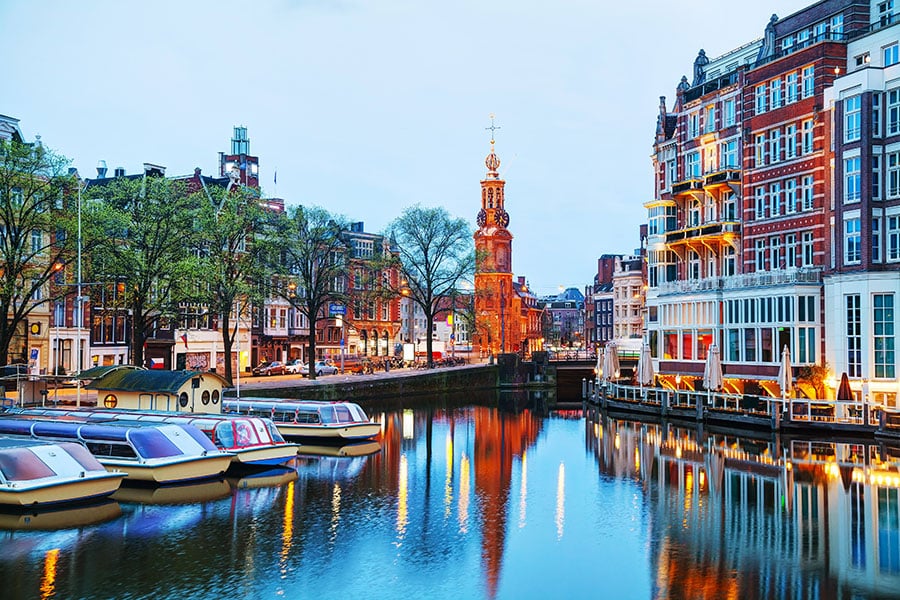Brexit : Which firms are moving to the Netherlands?

Continued uncertainty about Brexit has led many UK-based businesses to activate their contingency plans.
Companies have decided to move all, or part, of their operations to EU member-states in order to continue to serve their customers in the single market.
Precautionary measures include setting up EU offices alongside their UK ones, deferring investments from UK sites to European plants, or relocating altogether.
On 1 February 2019, the Institute of Directors – a British business association – reported that, based on its survey of 1200 company directors, “nearly one in three UK firms” were planning for a Brexit relocation.
The Netherlands is one of the countries firms have put on their shortlist.
In late January, the Dutch government’s foreign investment arm, NFIA, announced that it was talking to more than 250 companies which were thinking of moving some, or all, of their activities to the Netherlands.
Of course, any prudent executive will shop around and compare what Dutch regulators and tax authorities have to offer over their Irish, German, Spanish or French peers.
It is one thing to discuss the possibility of moving, actually moving is quite another.
In August 2019, the NFIA confirmed that 98 companies had “opted for the Netherlands” as a consequence of uncertainty around Brexit, but it offered little detail about the companies or their plans.
There are four different ways in which Brexit-impacted companies move to the Netherlands :
– Relocate activities to the EU market. In the case of multinationals, this will likely include setting up a legal entity or headquarters. This can also include moving a particular production line to the Netherlands;
– Expand existing activities in the Netherlands, and downscaling those in the UK;
– Set up a European headquarters that covers all European, including UK, activities;
– Open an EU office, allowing it to reproduce services for the EU market.
Financials come first :
Companies in the financial sector make up the majority of firms arriving in the Netherlands.
Among them are trading venues and boutique firms while – with some exceptions – few large commercial institutions have opted for the Netherlands.
One subgroup of firms consists of trading venues, markets or platforms.
These include exchanges like the CBOE, Bloomberg’s swaps market, TP ICAP, MarketAxess, the EU trading platforms of the London Stock Exchange and CME’s EBS and BrokerTec derivatives markets.
Though the number of employees connected with these moves is not large, the volumes of trade which will be routed through the Netherlands as a result of these moves are.
For instance, in August 2019, CME’s BrokerTec average daily European volume was EUR 263 billion.
Of course, the tax proceeds from transaction fees will accrue to the Dutch treasury.
The arrival of these trading venues and exchanges now lays the foundation for the further expansion of financial trading activities in and around Amsterdam.
A second subgroup includes boutique trading firms, many of them high-frequency traders, and FinTech companies.
They include companies like Jump Trading, Radix, Hard Eight, the Gelber Group, Azimo and CurrencyCloud.
Aside from access to the EU single market, it seems these firms are attracted by the friendly regulatory environment for FinTech and Amsterdam’s high-speed internet exchange point.
The decision of important derivatives markets to base their EU platforms in Amsterdam will also have played a role.
A third group consists of larger, and more traditional, financial companies.
Some, like BlackRock and Royal Bank of Scotland, have migrated assets, accounts or other parts of the balance sheet from the UK to an EU office in the Netherlands.
These steps are not accompanied by large transfers of staff. Others, including Australia’s CBA, two big Japanese banks – Norinchukin and MUFG – and two shipping insurance firms – Steamship Mutual and UK P&I Club – have chosen the Netherlands as their EU base, and their moves involve more staff rotation to Netherlands.
Meanwhile, at the behest of European financial regulators, the Dutch bank ING is moving risk managers, bond and currency traders from its London office to Amsterdam.
A No Deal Brexit which would sever ties between the City of London and the EU single market would surely add momentum to this trend among firms in the financial sector.
A media magnet ?
Ten percent of the firms identified work in the media industry.
For instance, the Japanese multinational Sony has decided to move its European headquarters to the Netherlands.
This is primarily a move for legal purposes, ensuring business continuity in the event of a No Deal Brexit.
Companies like Discovery have opted for the Netherlands to obtain EU licenses and guarantee their ability to broadcast across the EU.
Online and digital media companies like DAZN and TVT Media seek access to those same licences, but are also attracted by Amsterdam’s high-speed internet, its creative sector and the presence of other media firms like Netflix.
In the event of a No Deal Brexit, the BBC has also announced that an office in the Netherlands will allow it to operate with the necessary EU licenses.
Japanese cluster :
Aside from British firms seeking a foothold inside the EU single market, US and Japanese firms have also taken an interest in the Netherlands.
Most of the US firms on the list work in the financial sector, including many Chicago-based high-frequency traders.
The Japanese cluster, however, is noteworthy as it includes a diverse group of very large multinational companies
— like Panasonic, Sony, Mizuho, MUFG and Shionogi.
Some of the moves merely involve changing the company’s European legal structure – such as Sony’s decision to move its European headquarters – while other moves also include substantial job shifts, as is the case with Shionogi’s arrival.
Amsterdam is becoming a Japanese hub in Europe.
Aside from Amsterdam’s world-class connections, one reason for opting for the Netherlands may also be the existing presence of a number of Japanese household names including Mitsubishi, Hitachi and Canon.
With the words of Rem Korteweg, in his publication “Going Dutch : Which firms are moving to the Netherlands because of Brexit ?” for the Netherlands Institute of International Relations.
Have you read?
# Global Passport Ranking, 2019.
# The World’s Top 100 Most Successful Unicorns, 2019.
# GDP Rankings Of The World’s Largest Economies, 2019.
# Most Expensive Countries In The World To Live In, 2019.
Bring the best of the CEOWORLD magazine's global journalism to audiences in the United States and around the world. - Add CEOWORLD magazine to your Google News feed.
Follow CEOWORLD magazine headlines on: Google News, LinkedIn, Twitter, and Facebook.
Copyright 2025 The CEOWORLD magazine. All rights reserved. This material (and any extract from it) must not be copied, redistributed or placed on any website, without CEOWORLD magazine' prior written consent. For media queries, please contact: info@ceoworld.biz








